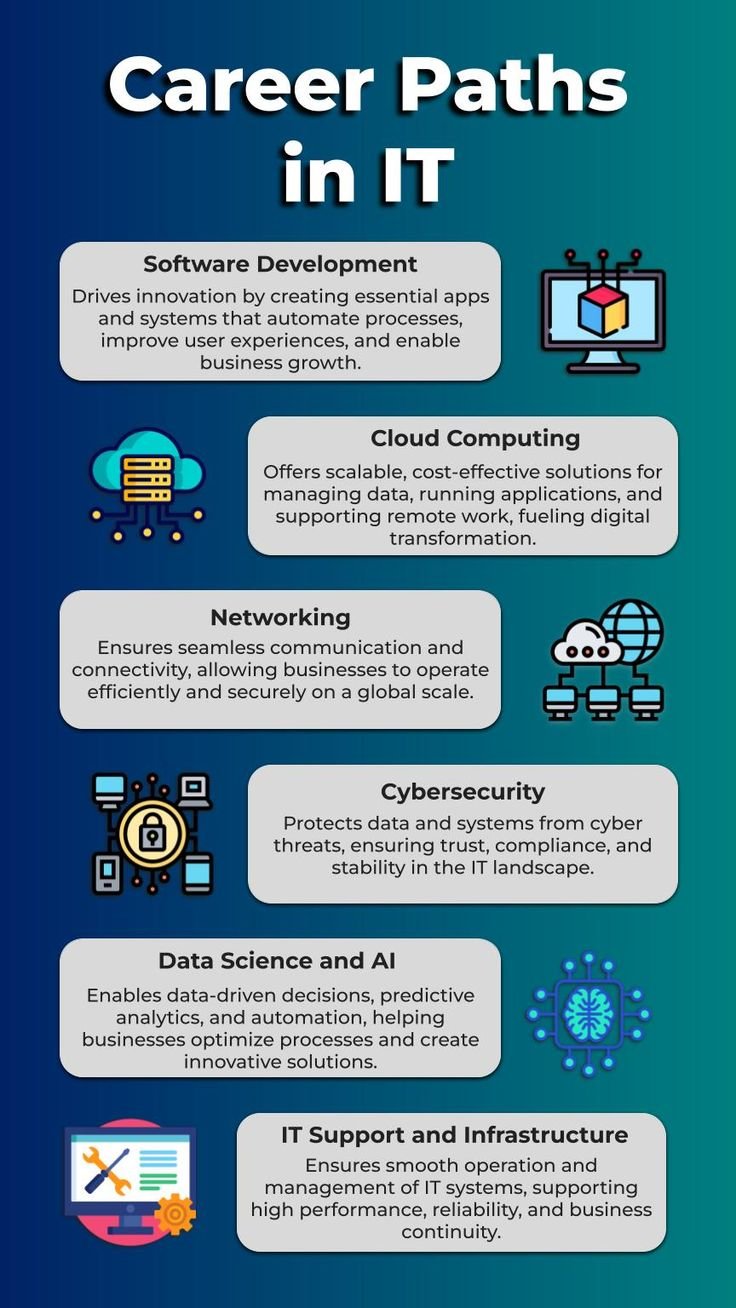Technology is no longer a secondary tool for businesses; it has become the driving force behind business strategies, innovation, and growth. From artificial intelligence (AI) to blockchain and the Internet of Things (IoT), technological advancements are rapidly transforming how businesses operate, make decisions, and engage with customers. As we approach 2025, technology is expected to further revolutionize business models, creating new opportunities and challenges. This article explores how technology is shaping the future of business and innovation, highlighting key developments that businesses must adopt to stay competitive.
1. Artificial Intelligence (AI) and Automation
Artificial Intelligence and automation are central to the transformation of business operations. By 2025, AI will have deeply integrated into industries such as healthcare, finance, retail, and manufacturing, driving efficiencies and enhancing decision-making processes.
- Key Developments: AI-driven technologies, including chatbots, predictive analytics, and personalized recommendation systems, are already enhancing customer service, marketing, and product development. Automation tools are being used to streamline workflows, reduce human error, and improve productivity across industries.
- Why It Matters: AI and automation reduce operational costs, increase speed, and allow businesses to offer more personalized experiences to customers. With AI predicting trends and automating repetitive tasks, companies can focus on innovation and customer-centric strategies, rather than getting bogged down by operational inefficiencies.
2. Data-Driven Decision Making
Data is becoming one of the most valuable assets for businesses. In 2025, businesses will rely more heavily on data analytics to make informed decisions that drive innovation, improve efficiency, and anticipate market changes.
- Key Developments: The use of big data, machine learning, and real-time analytics is growing rapidly. Businesses are now able to gather insights from a wide array of data sources—customer behaviors, social media, and IoT devices—to forecast demand, optimize supply chains, and develop new products.
- Why It Matters: Data-driven decision-making empowers businesses to act on accurate, real-time insights rather than intuition. This leads to better outcomes, such as more targeted marketing, optimized operations, and innovative product offerings that resonate with customers.
3. Blockchain and Decentralized Systems
Blockchain technology, initially popularized by cryptocurrencies, is increasingly being used to enhance transparency, security, and efficiency across various industries. By 2025, blockchain is expected to be a core part of business innovation strategies, especially in areas like supply chain management, financial services, and data security.
- Key Developments: Blockchain is being used to secure transactions, verify the authenticity of products, and ensure the privacy and integrity of sensitive data. With decentralized finance (DeFi) gaining traction, businesses can also use blockchain for financial transactions without the need for traditional banking systems.
- Why It Matters: Blockchain’s ability to provide transparent and immutable records reduces the risk of fraud, increases trust among partners, and improves the efficiency of business operations. For industries dealing with sensitive data, such as finance and healthcare, blockchain enhances security and ensures compliance with regulations.
4. The Rise of Cloud Computing
Cloud computing has already revolutionized how businesses operate, but by 2025, it will be an even more integral part of business infrastructure. Businesses will continue to migrate to cloud platforms for greater scalability, flexibility, and collaboration.
- Key Developments: Cloud-based services, such as Software as a Service (SaaS), Infrastructure as a Service (IaaS), and Platform as a Service (PaaS), allow businesses to scale quickly without the need for significant upfront investment in physical infrastructure. Multi-cloud strategies will also enable businesses to manage their operations across different cloud environments for added flexibility and reliability.
- Why It Matters: The cloud enables businesses to access powerful computing resources and data storage without high capital expenditure. It also promotes remote work and collaboration, allowing teams to work seamlessly across different locations. Cloud adoption is crucial for companies seeking to scale their operations and stay competitive in a fast-changing business environment.
5. The Internet of Things (IoT) and Smart Devices
The Internet of Things (IoT) is connecting everyday devices to the internet, enabling businesses to gather real-time data, optimize operations, and create new, innovative products and services. In 2025, IoT will be central to how businesses create efficiencies, improve customer experiences, and drive innovation.
- Key Developments: Smart devices—such as sensors, wearables, and connected appliances—are being used to track everything from inventory levels to customer preferences. In industries like manufacturing and logistics, IoT-enabled machines provide real-time data on performance and maintenance needs, minimizing downtime and improving productivity.
- Why It Matters: IoT technology allows businesses to gain real-time insights into their operations, customer behavior, and environmental conditions. This data helps companies optimize everything from inventory management to personalized product recommendations, ensuring that customers receive timely and relevant offerings.
6. Augmented Reality (AR) and Virtual Reality (VR)
Augmented Reality (AR) and Virtual Reality (VR) are becoming essential tools in business innovation, particularly in sectors like retail, real estate, education, and entertainment. By 2025, AR and VR will be widely used to create immersive customer experiences and enhance employee training programs.
- Key Developments: AR and VR are being used to create virtual showrooms, provide remote assistance, and offer interactive training experiences. For instance, in retail, AR allows customers to try on clothes virtually or see how furniture will look in their homes. In training, VR simulates real-life scenarios for employees to practice skills without risk.
- Why It Matters: AR and VR provide businesses with unique ways to engage with customers, improve training, and present products. These technologies offer an immersive experience that boosts customer satisfaction, increases engagement, and opens up new avenues for innovation in product development and marketing.
7. Cybersecurity Advancements
As businesses become more reliant on digital technologies, cybersecurity will be a major focus in 2025. With rising threats such as ransomware, phishing attacks, and data breaches, businesses must adopt innovative cybersecurity solutions to protect their data and maintain customer trust.
- Key Developments: Advanced security technologies, such as AI-driven threat detection, biometric authentication, and zero-trust security models, are becoming essential for safeguarding business operations. In addition, encryption and blockchain-based security protocols are enhancing data protection and privacy.
- Why It Matters: Cybersecurity breaches can lead to significant financial loss, reputational damage, and legal consequences. By investing in cutting-edge cybersecurity solutions, businesses can safeguard their data, protect customer information, and maintain their credibility in the market.
8. Sustainability and Green Technologies
As environmental concerns continue to rise, businesses are increasingly turning to sustainable practices and green technologies. In 2025, companies will focus on reducing their carbon footprints, using renewable energy, and developing eco-friendly products and services.
- Key Developments: Innovations in clean energy, electric vehicles, and sustainable supply chain management are gaining momentum. Technologies like solar panels, wind energy, and carbon capture are enabling businesses to reduce their environmental impact. Additionally, sustainable product design and packaging are becoming critical for companies that want to attract eco-conscious consumers.
- Why It Matters: Consumers and investors are prioritizing sustainability in 2025, and businesses that adopt green technologies will have a competitive advantage. Not only does sustainability help businesses meet regulatory requirements, but it also boosts brand reputation, attracts eco-conscious customers, and reduces operating costs in the long run.
9. Remote Work and Digital Collaboration Tools
The COVID-19 pandemic has accelerated the shift toward remote work, and in 2025, businesses will continue to adopt digital collaboration tools to manage distributed teams. Remote work technologies will evolve to offer more seamless communication, collaboration, and project management.
- Key Developments: Tools like Zoom, Microsoft Teams, and Slack have already become integral to remote work. In 2025, we can expect these platforms to offer even more advanced features, such as virtual offices, AI-driven task management, and real-time collaboration on documents and projects.
- Why It Matters: Remote work technologies enable businesses to maintain productivity while offering flexibility to employees. With the right tools, companies can improve team collaboration, reduce overhead costs, and attract talent from anywhere in the world.
10. Human Augmentation and Biotechnology
The fusion of technology and biology, known as human augmentation, is set to change healthcare and employee productivity. By 2025, we will see breakthroughs in wearable technology, biotechnology, and medical devices that improve human capabilities.
- Key Developments: Wearables that monitor health metrics like heart rate, glucose levels, and brain activity are becoming more advanced. Additionally, genetic engineering and medical AI are enabling new treatments for chronic diseases, and biotechnology is being used to enhance cognitive and physical capabilities.
- Why It Matters: Human augmentation technologies will improve quality of life, extend longevity, and enhance workplace productivity. Businesses can benefit from these innovations by offering employees advanced health monitoring, improving workplace wellness programs, and ensuring a more productive workforce.
Conclusion
Technology is not just shaping the future of business; it is defining it. In 2025, businesses that leverage AI, blockchain, IoT, and sustainable technologies will be better equipped to compete in an increasingly digital and environmentally-conscious world. From enhancing productivity with automation and AI to building more resilient business models with cybersecurity and sustainability, the role of technology in driving business innovation is undeniable. Staying informed about these emerging trends and adapting to them will be critical for businesses that want to thrive in the rapidly evolving marketplace.






